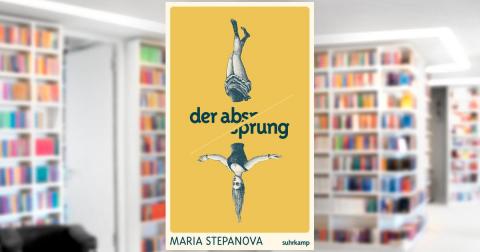Disappearing Act and the Search for Identity
On November 15, Stepanova presented her latest book “Disappearing Act” (“Focus”), at Columbia University. This is her first work written since Russia’s full-scale invasion of Ukraine and, although fictional, it deals with the issues faced by the post-2022 emigrants.
The plot is deceptively simple: a middle-aged writer, referred to only as M., travels to a literary festival in an unnamed country which is easily recognizable as Germany. When her train is canceled, she becomes stranded in a town called F. Initially focused on reconnecting with the festival organizers, she gradually abandons her original purpose for traveling.
A novella rather than a novel, both in size and scope, “Disappearing Act” talks about the liminal spaces M. finds herself in and her gradual transformation into a new person. The English title is a bit of a giveaway compared to the original (fokus in Russian can mean a trick, sleight of hand, not just a disappearing act), because it’s essentially a story of disappearance.
A prevalent theme in “Disappearing Act” is identity. Names are conspicuously absent — whether of people, countries, or cities. M. left her nameless home country a year earlier, a place she repeatedly calls “the beast,” which is invading its neighbor and killing civilians. The references are unmistakable, but the omission of names circumvents Russia’s censorship laws.
M. reflects, “The beast was always around me — to the point that it took me years to recognize that I lived inside the beast, or maybe I was born into it.”
The novella is full of short vignettes — memories of childhood spent in the Soviet Union, discussions with fellow writers at a lakeside house in B. (likely Berlin, where Stepanova herself was a fellow at the Wissenschaftskolleg residency).
One vignette revolves around M.’s critical attitude towards her home country, despite its “great achievements.” Her interlocutor counters, “Only in truly conservative societies is there still room for genuine otherness, which is what distinguishes one culture from another. Yes, culture is a bloody business…”
Throughout the book M. keeps noticing various beastly qualities in herself, for instance, her insatiable appetite. Part of the “disappearing act” is getting rid of these qualities. She distances herself from her country — and perhaps this estrangement explains why she can no longer write.
When asked if "Disappearing Act" is autobiographical, Stepanova responded, “An author shapes a kind of homunculus, a creation that bears some resemblance to its maternal entity. But it’s not me — it’s a version of me that undergoes all sorts of unsettling adventures, experiences things that could potentially happen in this experimental space that seems too painful, uncomfortable or impossible.”
At various points in the book the narrator reflects on the possibility that somewhere along the way she has died and is in a purgatory of some kind. She imagines a scene at a Turkish cafe where she dies in the bathroom, her absence unnoticed until the suitcase she is traveling with remains unclaimed by her table.
By chance M. ends up at a circus on the town’s outskirts. Overhearing two women speaking Russian, she volunteers to assist in the “sawing a woman in half” magic trick. At this point she starts calling herself A., shedding her identity as both a writer and a Russian, longing for transformation.
The circus itself conveys a sense of magic. The proprietor, a blind Jew, can tell that M. is “one of theirs” without looking at her. He’s also the only character with a name. In this scene M. for the first and only time calls herself a “Russian writer.” Of course, there’s also the magic of the circus act itself, where M. is cut in half and then “resurrected.”
The book’s ending leaves room for hope, making “Disappearing Act” a profound meditation on new emigrants’ quest for identity.
Andrei Muchnik

